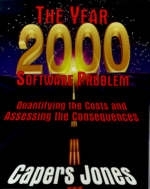
The Year 2000 Software Problem
Addison Wesley (Verlag)
978-0-201-30964-5 (ISBN)
- Titel ist leider vergriffen;
keine Neuauflage - Artikel merken
As the year 2000 rapidly approaches, an anxious clock is ticking for the world business community: When the twentieth century ends, many software applications will either stop working or produce erroneous results because their logic cannot accept the transition from 1999 to 2000. This problem is embedded in millions of aging software applications, and the costs of fixing the year 2000 software problem may constitute the single greatest expense in history. In this new book, Capers Jones offers a framework for examining the effect that the year 2000 problem will have on your company, placing this timely issue into a practical business perspective. The Year 2000 Software Problem explains what it will cost to address this impending issue, quantifying the expenses by country, industry, programming language, and application. The book further examines the expected results of not achieving year 2000 compliance and estimates what the damages and recovery costs will be.
Highlights include: *An executive overview of the year 2000 problem and why it is significant *A discussion of the impact of repairing databases, repositories, and data warehouses *An explanation of the litigation risks and liability issues associated with this problem *A description of the important topic of year 2000 testing The information contained in this book will allow you to fully understand what needs to be done to minimize the risks and problems that the year 2000 problem will inevitably bring. The author's pragmatic approach allows you to assess the scope of the problem, identify the appropriate solution strategy, and test and measure the effectiveness of your solution implementation. 0201309645B04062001
Capers Jones is a leading author and speaker on software productivity and measurement as well as the acknowledged expert on the economic impact of the year 2000 software problem. He is a frequent speaker at software engineering conferences. Formerly a senior researcher at IBM's Santa Teresa software laboratory and Assistant Director of Applied Technology at the ITT Programming Technology Center, Jones is Chairman and Founder of Software Productivity Research. He is also a member of IEEE Computer Society and the International Function Point Users Group (IFPUG). 0201309645AB04062001
Foreword by Paul Strassmann.
Preface.
Acknowledgments.
1. Introduction and Executive Overview.
Potential Year 2000 Problems that Affect Daily Life.
Potential Year 2000 Problems that Affect Executives.
Timeline for Starting Year 2000 Repairs in 1998.
A Two-Year Calendar for Millennium Software Repairs.
A One-Year Calendar of Post 2000 Damages and Litigation.
Rules of Thumb for Year 2000 Resources.
2. The Origins of the Year 2000 Problem.
Root Causes of the Year 2000 Problem.
Hazardous Implications of the Year 2000 Problem.
Beneficial Implications of the Year 2000 Problem.
Fallacies Associated with the Year 2000 Problem.
3. Terms and Concepts Associated with the Year 2000 Problem.
Application.
Software Portfolios.
Data Base.
Software Staff.
Enterprise.
Software Sites.
Test Libraries.
4. Function Points Versus Lines of Code Metrics for the Year 2000 Problem.
Function Points and Programming Languages.
The Volume of U.S. Software Expressed in Function Points.
Function Points and Mixed Language Projects.
A Year 2000 Repair Case Study.
Correlating the Gartner Group LOC data and the SPR function point data.
A Checklist of Year 2000 Repair and Recovery Costs.
Relative Costs of Year 2000 Damages and Repairs.
A Checklist of Critical Software Application Types.
5. The Size of the Year 2000 Problem for the United States.
The Volume of Software Installed in the United States.
Hardware/Performance Implications of the Year 2000 Problem.
Year 2000 Repairs by Industry.
Year 2000 Repairs by Company Size.
Triage of Software Applications.
Year 2000 Repairs by Programming Language.
Year 2000 Repairs by State.
Aggregation of all Year 2000 Costs for the United States.
Tools and Technologies Which Affect the Year 2000 Problem.
Examples of Return on Investment Calculations.
Unusual Methods for Speeding Up Year 2000 Repairs.
Around the clock year 2000 repair centers.
Suspension of anti-trust regulations for year 2000 repairs.
Suspension of non-year 2000 projects.
Suspension of Euro-currency conversions.
Acquisition of year 2000 service companies.
Year 2000 Schedules Versus Resources.
Shortage of Programmers and Reluctance to Work on Year 2000.
Small Companies and the Year 2000 Personnel Shortage.
Post 2000 Software Personnel Surplus.
The Emergence of Year 2000 Insurance.
The Emergence of Certification for Year 2000 Service Providers.
The Emergence of the de Jager Year 2000 Stock Index.
Personal Computer Year 2000 Problems.
Scorecard of Year 2000 Preparations by Industry.
Cautions about Database Repairs Using Date Field Expansion.
Cautions about Dead Code Repair Costs.
Cautions About Missing or Uncompilable Source Code.
The Prognosis of Object Code Year 2000 Repairs.
6. Testing, Test Case Errors, and Repairing Software Regression Test Libraries.
General Forms of Testing and the Year 2000 Problem.
Subroutine testing.
Unit testing.
New function testing.
Regression testing.
Integration testing.
System testing.
Specialized Forms of Testing and the Year 2000 Problem.
Stress or capacity testing.
Performance testing.
Viral protection testing.
Security testing.
Platform testing.
Year 2000 testing.
Independent testing.
The Forms of Testing Involving Users or Clients.
Usability testing.
Field (Beta) testing.
Lab testing.
Customer acceptance testing.
Clean-room statistical testing.
Numbers of Testing Stages for Year 2000 Software Projects.
Testing Stages in Lawsuits Alleging Poor Quality.
Using Function Points to Estimate Test Case Volumes.
7. Repairing Data Bases, Repositories, and Data Warehouses.
8. Litigation and Liability Potential for the Year 2000 Problem.
Financial Disclosure and Executive Year 2000 Liabilities.
Year 2000 Disclosure Requirements for Public Companies.
Accounting Standards for Year 2000 Costs.
Possible Tax Credits for U.S. Companies.
Possible U.S. Tax Consequences From Reusable Repairs.
9. Business Failure Potential for the Year 2000 Problem.
Business Failure Potentials Based on Company Size.
Business Failure Potentials Based on Industry.
Business Failure Potentials Based on Financial Health.
Business Failure Potentials Based on Litigation.
Codicil: Business Failures Based on Loss of Essential Services.
10. The Emergence of the Year 2000 Repair Industry.
11. The Development of “Masking” for Year 2000 Repairs.
Windowing.
Compression.
Encapsulation.
Bridging.
Object Code Date Interception.
12. International Year 2000 Repair Effort.
Year 2000 Repairs by Country.
Year 2000 Problem and 35 Urban Areas.
The Overlap of the Year 2000 and Euro-currency Conversion.
Aggregation of Global Year 2000 Repairs.
13. Why Do Year 2000 Costs Vary?
Variations in Burden and Overhead.
Variations in Work Habits and Unpaid Overtime.
14. Post 2000 Problem and Recovery Prognosis.
Damages from Unrepaired MIS applications.
Damages from Unrepaired Systems Software.
Damages from Unrepaired Embedded Software.
Damages from Unrepaired Military Software.
Damages from Unrepaired Commercial Software.
Damages from Unrepaired Scientific Software.
Damages from Unrepaired End-User Software
Pattern of Expenses for Damages and Recovery.
Evaluating Pre-2000 and Post-2000 Expenses for the U.S.
Sources of Error in Year 2000 Cost Estimates.
Sources of Error in Software Year 2000 Repairs.
Sources of Error in Test Library Year 2000 Repairs.
Sources of Error in Data Base Year 2000 Repairs.
Sources of Error in Litigation Year 2000 Costs.
Evaluating Global Pre-2000 and Post-2000 Costs.
15. Defenses Against Unrepaired Year 2000 Problems.
General Strategies as the Year 2000 Approaches.
Corporate Year 2000 Defense Strategies.
Manual Back-Ups for Automated Processes.
Advice for Non-Compliant Companies.
Federal Government Year 2000 Defense Strategies.
Military Year 2000 Defense Strategies.
State and Local Government Year 2000 Defense Strategies.
Personal Year 2000 Defense Strategies.
Summary and Conclusions.
Appendix A: Sources of Information in this Report.
Appendix B: Additional Information on the Year 2000 Problem.
Appendix C: Year 2000 World Wide Web Sites.
Appendix D: Programming Languages And the Year 2000 Problem.
Appendix E: Annotated Bibliography of Year 2000 Books.
Appendix F: Glossary of Year 2000 Terms. 0201309645T04062001
| Erscheint lt. Verlag | 2.1.1998 |
|---|---|
| Verlagsort | Boston |
| Sprache | englisch |
| Maße | 188 x 235 mm |
| Gewicht | 635 g |
| Themenwelt | Mathematik / Informatik ► Informatik ► Software Entwicklung |
| Recht / Steuern ► Privatrecht / Bürgerliches Recht ► IT-Recht | |
| ISBN-10 | 0-201-30964-5 / 0201309645 |
| ISBN-13 | 978-0-201-30964-5 / 9780201309645 |
| Zustand | Neuware |
| Haben Sie eine Frage zum Produkt? |
aus dem Bereich


